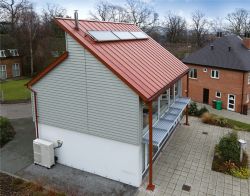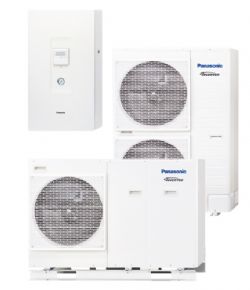Renewable energy is under the spotlight, especially in light of the recent controversy over the Renewable Heat Incentive. Marc Diaz outlines the RHI opportunities for contractors
The Government's Renewable Heat Incentive (RHI) is a key policy initiative aimed at revolutionising the way heat is generated and used. Billed as the first financial support scheme for renewable heat of its kind in the world, the first phase of the RHI is focused on providing long-term tariff support in the non-domestic sectors, the big heat users in the commercial, industrial, and public sector, which contribute 38 per cent of the UK's carbon emissions.
DECC (the Department of Energy and Climate Change) anticipates that 123,000 projects in these areas could benefit from the RHI over the next decade. It's an ambitious target.
A recent statement from OFGEM, which administers the RHI on behalf of the Government, revealed that the uptake since the scheme's launch at the end of November 2011 had been incredibly slow.
At the time of the statement, just six non-domestic projects had been accredited under the RHI, comprising four solid biomass boilers, one ground source heat pump and one water source heat pump. All six installations were made in November and December last year, with none completed in either January or February 2012.
So, what are the issues? Well, clearly, there is an education job that needs to be done.

Application process unfamiliar
The RHI is still relatively new and the application process for achieving accreditation under the scheme is an unfamiliar one. To be fair, OFGEM recognises this issue and is taking steps to help the market understand what information is required to make a successful RHI application.
At the same time, as the first results of the scheme were revealed, OFGEM announced a series of free events around the UK to help those wishing to apply for the non-domestic RHI and those who have already applied. but have not yet been successfully accredited.
While the RHI scheme as it applies to the non-domestic sector may be clear cut, the fall-out from the well publicised uncertainty of the RHI in the residential sector has affected confidence in the scheme overall. The sooner the argument over Feed-in Tariffs in domestic applications is completely resolved, the better.
What is clear is that the RHI for non-domestic buildings presents a great opportunity for heat pump installers. Air-to-water heat pumps are an eligible technology under the scheme and offer the most practical, carbon efficient alternative to conventional heating technology, particularly in light commercial applications.
The latest air-to-water heat pumps on the market offer a maximum CoP (coefficient of performance) of 4.74. That means that for every kW of electricity put in, you will get 4.7kW out in terms of useable heat and hot water. This compares incredibly favourably to conventional gas boiler or electric heating systems which typically have a maximum CoP of 1.
It is important to choose the correct air-to-water heat pump for the job in hand. For example, heat pumps typically work much more efficiently at a lower temperature than a standard boiler system would. So they are often used in underfloor heating systems or larger radiators, which give out heat at lower temperatures over longer periods of time.
Unlike other renewable technologies eligible under the RHI, air source heat pumps are also a 'fit and forget' technology. They need little maintenance and are much easier and more cost-effective to install than a ground source heat pump.
Where office or retail space is at a premium, new heat pump designs are now available which effectively combine the outdoor and indoor units into one, easy-to-install mono-bloc package.

The RHI has created a relevant and financially attractive market opportunity for contractors working in the commercial, industrial and public building space. Air-to-water heat pumps provide an attractive technology solution that, with OFGEM's support in understanding the RHI application process, will help the HVAC sector take advantage of the scheme. This way, we can work together to drive the renewable sector forward and make the carbon emission cuts that the Government demands.
// The author is country manager for Panasonic //